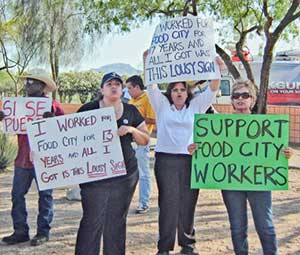
Grace Mercado, Lucia Paz and Frances Hernandez.
Mercado and Paz say they were fired for trying
to organize a union.
WW photo: Paul Teitelbaum
By Paul Teitelbaum
Tucson, Ariz.
Published May 20, 2009 2:49 PM
Lucia Paz spent the last 17 years working for the Food City division of Bashas grocery store chain in Tucson. During that time, she diligently performed her job duties: stocking shelves, running the cash register and assisting customers. She was a conscientious worker and was never considered a troublemaker. On May 11 Paz was terminated for failing to follow policy and procedures. What she failed to follow was never revealed to her, and Bashas/Food City management refused to comment on the reasons for the firing, even to the mainstream media.
Grace Mercado worked for 13 years at the same store as Lucia Paz, and on May 11 she also received a termination notice from Food City. She too had failed to follow some un-named policy and procedure.
What these two brave Latina women were doing was talking to workers and organizing a union at Food City. They are convinced they were fired for failing to follow the chains unspoken anti-union policy. They spoke to other workers at the store and to hundreds of people gathered at the Tucson May Day rally about their struggle to form a union. They brought in representatives from the Food and Commercial Workers union (UFCW) to help them organize, and they exposed the abusive conditions at Bashas Food City stores.
Paz explained to this reporter that when she started 17 years ago, the store was a Bashas supermarket, but in 2006, Bashas management decided to abandon their stores in poor and oppressed neighborhoods and changed the name from Bashas to Food City, while building new Bashas supermarkets in more affluent neighborhoods. The new Bashas had Starbucks cafes, sit-down dining areas and other amenities to cater to the more privileged neighborhoods.
The Food City stores, on the other hand, received no improvements and the quality of produce and meat for their customers, mostly Latina/os and other people of color, was of poor quality and not fit for sale in a Bashas.
Paz further explained that when the new Bashas stores were opened in 2006, she and many others applied to be transferred to them. It turned out that all the Latina/o workers who applied were denied transfer and individually told they were better suited to work at Food City. White workers were granted transfers and moved to the new stores. It was this injustice that made Paz and Mercado decide to contact UFCW.
The Bashas/Food City management responded with an anti-union campaign, stooping so low as to accuse workers of theft and then posting the workers pictures in areas where the workers congregated with a caption that read: This is your union organizera Thief!
The company recently implemented a two-tier wage system with new hires wages ranging from $8 to $11 an hour, while longer-working employees make more than $15 an hour. Now the company is using the economic crisis as a pretext to cut the hours of first-tier employees, often cutting their hours enough to deny them medical and other benefitssince they no longer qualify as full-time workers. New Bashas stores are still being built, however, while Food City stores are being neglected and their workers pushed toward lower wages.
On May 13, after learning of Pazs and Mercados terminations, the Tucson May 1st Coalition and UFCW organized a militant, well-attended rally in front of the Food City store where the two had worked. Many of those who participated, some of whom are current employees of Food City, vowed to continue the struggle to form a union.
Amy Gellatly, a UFCW organizer who has been working with the Food City employees, explained how the situation at Food City relates to passage of the Employee Free Choice Act. Even though they have the right to form a union, Gellatly explained, workers take a real risk when they speak out, and it shouldnt have to be like that. Workers should not have to be afraid of losing their job just because they were trying to exercise a basic rightthe right to organize.
The fact that Lucia and Grace have lost their jobs over this right shows just how important it is to reform labor laws in this country. With the Employee Free Choice Act, workers get a fair and direct path to form unions through majority sign-up; they can secure a contract with their employer in a reasonable period of time; and the law gives tougher penalties to employers who violate workers rights, said Gellatly. In this case we wouldnt have to worry about employers trying to scare people away from the union or getting rid of strong supporters.
Text
Articles copyright 1995-2009 Workers World. Verbatim copying and distribution of this entire article is permitted in any medium without royalty provided this notice is preserved.
SOURCE SITE
http://www.workers.org/2009/us/tucson_0528/